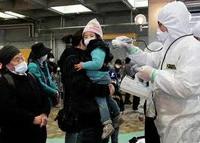-
Climatic impacts of megapolitan expansion
Arizona’s Sun Corridor is the most rapidly-growing megapolitan area in the United States. Nestled in a semi-arid environment, it is composed of four metropolitan areas: Phoenix, Tucson, Prescott, and Nogales. With a population projection expected to exceed 9 million people by 2040; a first study of its kind, attempting to quantify the impact of rapidly expanding megapolitan areas on regional climate, showed that local maximum summertime warming resulting from projected expansion of the urban Sun Corridor could approach 4 degrees Celsius
-
-
Canadian company offers the first treatment to neutralize red mud

Red mud is the most significant waste product of the traditional Bayer process for aluminum production; the industry produces more than 100 million tons of red mud a year, of which less than 5 percent is be reused; the rest is stored in ponds and reservoirs, posing serious environmental and economic risk; on 4 October 2010, for example, a flood of toxic red mud devastated Hungary after a retaining dyke ruptured, causing an ecological disaster; Canadian company Orbite Aluminae offers a technology to tackle the aluminum industry’s most serious problem
-
-
Forget blizzards and hurricanes, heat waves are deadliest

Tornadoes, blizzards, and hurricanes get most of our attention because their destructive power makes for imagery the media cannot ignore; for sheer killing power, however, heat waves do in far more people than even the most devastating hurricane; Hurricane Katrina and its floods, which devastated New Orleans and the Gulf Coast in 2005, exacted a death toll of 1,836 people; the heat wave which enveloped Europe during the course of three excruciating weeks in August 2003 of that year, killed an estimated 70,000 people
-
-
Examination of Finnish lakes reveals radiation secrets
A new study casts doubt over the validity of models used to assess the impact of radiation on human health; an examination of the affects of radioactive fallout from the 1986 Chernobyl accident on two Finnish lakes sows that the transfer of the radioactive compounds is non-linear, and that the levels of radioactive compounds appear to be three times higher in fish-eating species (piscivores) than in non-fish-eating species
-
-
Science group: storing spent nuclear fuel in dry casks significantly safer then wet pools storage

An NRC report on the lessons of the Fukushima disaster says that storing spent nuclear fuel in wet pools is “adequate” to protect the public; a science groups says there is a significantly safer way to store the 55,000 tons of radioactive waste currently stored by the 104 nuclear power plants operating in the United States: transferring the spent fuel to dry casks
-
-
Deadly E. coli strain decoded
The secret to the deadly 2011 E. coli outbreak in Germany has been decoded; the deadliest E. coli outbreak ever, which caused fifty-four deaths and sickened more than 3,800 people, was traced to a particularly virulent strain that researchers had never seen in an outbreak before
-
-
Calculating the global health consequences of the Fukushima nuclear disaster

Radiation from Japan’s Fukushima Daiichi nuclear disaster may eventually cause approximately 130 deaths and 180 cases of cancer, mostly in Japan; researchers have calculated; the estimates have large uncertainty ranges, but contrast with previous claims that the radioactive release would likely cause no severe health effects
-
-
Students and scientists gather in Singapore to discuss water problem
International university students and water experts have converged at Singapore’s Nanyang Technological University (NTU) to foster an intellectual and research community on a scarce natural resource — water
-
-
Viewing terrorist attacks on TV increases pain intensity

A new study finds that exposure to media coverage of terrorist missile attacks increases pain levels in people already suffering from chronic pain
-
-
New sensors detect contaminants in water
Many organic contaminants in the air and in drinking water need to be detected at very low-level concentrations; researchers have investigated the use of graphene oxide films in which the semiconductor titanium dioxide (TiO2) and metal nanoparticles are deposited on opposite sides of the graphene surface
-
-
Tasers do not cause cardiac complications: study

Tasers are commonly used by law enforcement personnel worldwide as an intermediate-force option to subdue and apprehend potentially dangerous or combative suspects; tasers function by delivering a series of very brief high-voltage, low-current electric pulses that result in pain, muscle contraction and inhibition of voluntary movement; taser shots to the chest are no more dangerous than those delivered to other body locations, according to a new study
-
-
Loo turns poo into power
Researchers have invented a new toilet system that will turn human waste into electricity and fertilizers and also reduce the amount of water needed for flushing by up to 90 percent compared to current toilet systems
-
-
Paper-printed rapid disease detection test
Complex laboratory investigations do produce reliable results, but they are not useful for point-of-care diagnostics; researchers have come up with a clever idea: biosensors based on paper; the test is printed on one side of a chromatography paper, the paper is folded up origami-style, laminated, and the test is ready; test evaluation requires only a voltmeter
-
-
New Red Cross first aid app brings safety tips to smart phones
The American Red Cross today (Wednesday) launched its official first aid app, putting free lifesaving information in the hands of smart phone users. The Red Cross says this app is the first in a series to be created by the organization
-
-
Rattlesnakes in San Diego: potent, powerful venom a cause for concern

For the second year in a row, University of California-San Diego Medical Center toxicologists are reporting unusually powerful snake bites and unusually extreme patient reactions to those bites; since January, several patients have suffered bites with severe symptoms, such as difficulty breathing, often after a bite from the Southern Pacific Rattlesnake
-
More headlines
The long view
A Shining Star in a Contentious Legacy: Could Marty Makary Be the Saving Grace of a Divisive Presidency?
While much of the Trump administration has sparked controversy, the FDA’s consumer-first reforms may be remembered as its brightest legacy. From AI-driven drug reviews to bans on artificial dyes, the FDA’s agenda resonates with the public in ways few Trump-era policies have.
